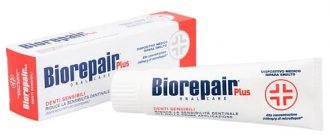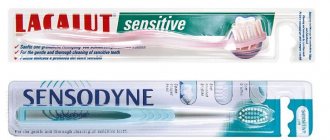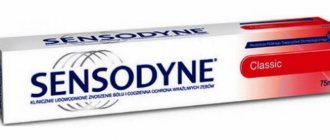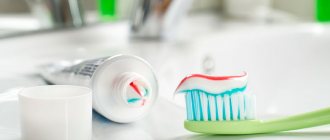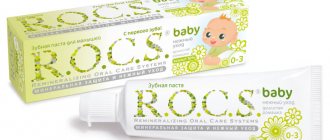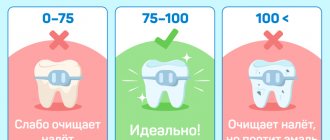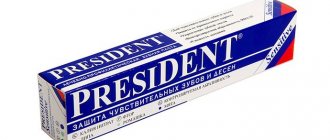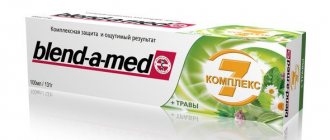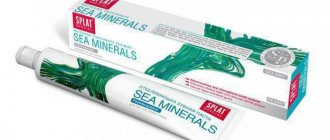From this article you will learn:
- causes of hypersensitivity of human teeth,
- best toothpaste for sensitive teeth,
- analysis of paste compositions, rating 2022.
Toothpaste can act not only as a means for cleaning teeth, but also, thanks to the inclusion of a number of active ingredients, help reduce tooth hypersensitivity, relieve inflammation in the gums, and also help strengthen tooth enamel. With increased tooth sensitivity, pain usually occurs in response to thermal and mechanical stimuli - cold, hot, when touching the teeth with a toothbrush, and sometimes even from sweets.
In most cases, this problem can be solved at home, using special toothpastes for sensitive teeth, as well as by applying gels containing one of the fluoride compounds to the necks of teeth. Pastes and gels from different manufacturers, due to their different compositions, differ in their effectiveness, and in this article we will analyze the composition of the most popular products for relieving hypersensitivity of tooth enamel.
Causes of hypersensitivity development –
First of all, this problem is associated with the thinning of the enamel layer in the area of the necks of the teeth, or with the exposure of the roots of the teeth and the thinning of the “cement” layer located on their surface.
As a result, a deeper layer of tooth tissue is exposed - dentin, which is located immediately under the enamel and cement. Dentin microscopically consists of dentinal tubes in which fluid circulates. If the dentin is not covered with enamel and cement on top, then thermal and other irritants can sharply increase the speed of fluid flow through the dentinal tubules, which ultimately leads to irritation of the nerve endings in the dental pulp and the occurrence of pain. The trigger for the development of pain (in the presence of dentin exposure) can be the consumption of acidic foods and drinks, the use of whitening toothpastes, etc.
Manufacturer
The pharmaceutical company GlaxoSmithKline is one of the world's largest manufacturers of over-the-counter oral health products. Under her leadership, products of such well-known brands as Sensodyne, Parodontax, Corega, and Aquafresh are produced.
The main facilities of this giant are located in the UK, Ireland, Singapore, Spain and the USA. Research work is carried out in 20 laboratories equipped with modern equipment, under the guidance of highly qualified specialists.
The Sensodyne brand, known in most European countries, including Russia, develops and produces toothpastes designed specifically to combat tooth sensitivity, gum inflammation and plaque on enamel.
How to choose a toothpaste for sensitive teeth -
Toothpastes for relieving tooth sensitivity (hypersthesia) have specific characteristics. Firstly, toothpaste for sensitive teeth usually has a fairly low abrasiveness within the RDA range of 25 to 35 (RDA - abrasiveness index). For example, for ordinary therapeutic and prophylactic toothpastes the RDA index is 75, and for whitening pastes it is usually 100-120.
The second important point to pay attention to is the active components. Different manufacturers use ingredients that are different from each other, which have different mechanisms for reducing tooth sensitivity, and as a result, have different effectiveness and different speed of onset of effect. Based on the mechanism of action, the following groups of components can be distinguished...
Active components in toothpastes for sensitive teeth -
- Potassium nitrate, potassium chloride - these components block the transmission of nerve impulses.
The transmission of nerve impulses is based on the exchange of potassium ions (located inside nerve cells) with sodium ions located outside the nerve. By increasing the concentration of potassium ions around the nerve endings, we disrupt this exchange, which leads to the absence of pain in the teeth - in response to thermal and mechanical stimuli. The advantage of these components is that the effect of their use develops very quickly. However, the result will last as long as you use them. Thus, potassium nitrate and chloride can quickly relieve pain, but they do not eliminate the very cause of hyperesthesia.
- Fluorides, strontium chloride, zinc citrate, hydroxyapatite - these components affect precisely the cause of the development of dental hypersensitivity - the accelerated movement of fluid in the dentinal tubules, which leads to irritation of the nerve endings.
Fluoride compounds (sodium fluoride, aminofluoride, monofluorophosphate), strontium chloride, zinc citrate, hydroxyapatite - all of them clog the dentinal tubules, preventing the movement of fluid in them. In addition, strontium chloride also promotes the deposition of replacement dentin and the compaction of its structure, which also helps reduce hypersensitivity. However, the downside of all these components is that the effect from their use develops more slowly than from the use of potassium nitrate or potassium chloride.
- Arginine and calcium carbonate combination - a combination of Arginine (an amino acid) and calcium carbonate in toothpaste - is also very effective in treating dental hypersensitivity.
Arginine facilitates the deposition of a layer of calcium carbonate on the surface of the teeth, which in turn stimulates the deposition of phosphates on the surface of exposed dentin and in the dentinal tubules, contributing to their clogging and reducing the movement of fluid in them. However, although it reduces sensitivity well, it does not solve the problem of demineralization of enamel and dentin. It should be noted here that the layer of calcium carbonate with arginine will be inactive, and calcium from this layer will not penetrate into the hard tissues of the teeth. This distinguishes arginine carbonate pastes from pastes with fluorides, after the use of which an active layer of calcium fluoride (CaF2) is created on the tooth surface. In addition to the fact that CaF2 also clogs the dentinal tubules on the surface of exposed dentin, calcium and fluoride from this layer are able to penetrate into the hard tissues of the teeth, strengthening them.
Conclusions -
Precisely because some components are capable of providing an immediate effect, while others (although their effect develops slowly, they eliminate precisely the cause of pain) - most toothpastes for sensitivity are made with a combined composition. Where potassium nitrate quickly relieves pain, and fluorides, hydroxyapatite, strontium chloride, or a combination of arginine and calcium carbonate clog exposed dentinal tubules.
However, there are also effective monocomponent products for use at home. Such products contain a very high concentration, usually of only one component, for example, potassium nitrate or sodium fluoride. In this way, they resemble professional means for reducing sensitivity that dentists use in their work. Examples of such gels are PRESIDENT Sensitive Plus and Colgate® Duraphat. How they can help you - read below.
Review of the best toothpastes
Toothpaste must be chosen not only based on advertising and cost, but also on the components of the composition. The safety of your teeth and gums depends on it.
- LACALUT Extra Sensitive.
This pasta takes an honorable first place and there is an explanation for this. It is of German production and quality. It contains beneficial active ingredients. They strengthen tooth enamel and reduce sensitivity. Pain sensations are reduced.
- PRESIDENT Sensitive.
This pasta is made by an Italian company. It contains less fluoride. However, it is also effective and in good standing. Its active components are the necessary substances. Potassium nitrate affects nerve endings, thereby reducing their sensitivity and reducing negative sensations. Sodium fluoride helps strengthen enamel. Hydroxyapatite nourishes the enamel with calcium and activates its resistance to temperature. A low level of abrasiveness allows you to efficiently remove plaque without damaging the enamel.
- SENSODYNE F.
This is an English-made paste in which the active ingredients are sodium fluoride and zinc. It has a healing effect and restores damaged enamel, reduces the sensitivity threshold. This is an excellent option for an inexpensive but effective paste. Of course, the effect will be smaller than the leaders, but nevertheless it will be there.
- SILCA Complete Sensitive.
This is a budget option when dealing with sensitivity. Contains medicinal substances. They block calcium leaching and neutralize acids. With constant use, the level of hyperesthesia decreases.
Toothbrushes for sensitive teeth –
In cases where the touch of the toothbrush bristles to the necks of the teeth causes pain and discomfort, it is recommended to use special toothbrushes with soft bristles when brushing your teeth. These brushes are marked “Soft”. They also differ from ordinary toothbrushes in that each bristle has a rounded or very thin atraumatic tip.
Price for toothbrushes for sensitive teeth –
- SENSODYNE Sensitive toothbrush – from 160 rubles,
- LACALUT Sensitive toothbrush – from 190 rubles.
Important: use this brush only in cases where pain occurs when touching your teeth with a regular toothbrush. They cannot be used on an ongoing basis, because... Brushes with soft bristles remove microbial plaque from teeth much worse than brushes with medium hardness, and therefore, with prolonged use, plaque and tartar may accumulate on the teeth.
Features and Benefits
The main advantage of Sensodyne toothpastes compared to analogue products is the use in their production of the unique NovaMin technology, developed by the company's scientists, in combination with sodium fluoride.
The result of this development is the formation of a protective layer on the surface of the teeth, which covers the exposed dentin and penetrates the dentinal tubules, sealing them.
This leads to a decrease in tooth sensitivity and pain under the influence of various external factors.
Modern methods of treatment of caries of primary teeth and preventive measures. Read reviews about the Aquapulsar OS 1 irrigator here.
At this address https://dr-zubov.ru/krasota-i-uxod/sredstva/zubnye-pasty/prezident-ultrasovremennyj-s-italyanskoj-produkciej.html we offer a detailed description of the President whitening toothpaste.
Range of Sensodyne pastes with fluoride
All types of Sensodyne dental pastes are characterized by:
- Gentle on enamel.
- Achieving results quickly.
- The effectiveness of treatment.
Whitening
Sensodyne Whitening whitening toothpaste does not contain abrasives and is characterized by a triple effect on enamel:
- Cleansing.
- Removing black spots.
- Prevention of pigmentation.
Due to the absence of large abrasive components in the composition, the product has a safe whitening effect. The result is noticeable after 7 days of continuous use.
Gentle Whitening
Gentle Whitening whitening paste gently lightens enamel and breaks down tartar. Compared to other products in this line, Gentle Whitening works on the enamel for a longer period of time.
Extra Whitening
Sensodyne paste with fluoride for strong whitening performs the following functions:
- Eliminates darkening of enamel.
- It clogs the dentinal tubules, preventing the penetration of irritants to the nerve endings.
- Envelops and protects tooth enamel.
Extra Whitening toothpaste with an instant effect can be used by those with sensitive teeth. Its action is aimed at achieving quick results without negative effects on the enamel.
True White
Sensodyne Instant Effect True White does not contain abrasive particles. But despite this, she :
- Gently removes pigment particles from enamel.
- Cleans the surface of teeth from the yellowness of tobacco smoke.
- Blocks sensitive tooth endings.
Fluoride
Sensodyne with fluoride Fluoride is aimed at performing the following tasks:
- Remineralization of teeth.
- Instant blocking of nerve endings.
- Instant relief from tooth sensitivity.
Sensodyne Fluoridated Toothpaste for Sensitive Teeth provides complete nerve blocking for quick pain relief.
Total Care
The action of Total Care toothpaste is aimed at daily protection of teeth and gums, safe whitening of enamel and stopping the development of carious processes. The product is suitable for people with slightly increased tooth sensitivity, as it is not able to instantly dull the pain. The therapeutic effect of the paste is observed only after 3 days of its continuous use.
Gum Care
The focus of Gum Care is gum protection. It effectively anesthetizes teeth, cleanses them of plaque, subgingival and supragingival calculus, and relieves periodontal inflammation. The peculiarity of the product is that it contains an antimicrobial complex, which prevents the accumulation of harmful bacteria in the oral cavity. The course of treatment is about 2 months.
Complete Protection
The action of Sensodyne Complete Protection toothpaste is aimed at comprehensive protection of teeth and gums, elimination of inflammatory processes, prevention and treatment of mild forms of caries and gingivitis. It stabilizes tooth sensitivity and has an antibacterial effect. Dentists recommend using Complete Protection daily.
Rapid
Sensodyne Rapid toothpaste has an immediate effect and is designed to eliminate increased sensitivity of teeth and prevent its recurrence. This product is not intended for daily use; it is used only for medicinal purposes.
ProName
The main task of Sensodyne ProNamel is to prevent acid attack on enamel and gums. The product stops and prevents the occurrence of erosion, restores the surface of the teeth and normalizes the acid-base balance in the oral cavity.
Sensodyne ProNamel is used for daily dental care. Thanks to its unique composition, the paste envelops their surface and ensures its remineralization.
Which desensitization paste to choose for a child?
The delicate enamel of baby teeth requires special delicate care. Children's toothpaste should not contain SLS, parabens, or titanium dioxide. If the paste foams a lot, it means that it contains SLS, and it is better to discard it.
It is important that the amount of abrasives is minimal (RDA - from 0 to 20).
Children's toothpaste should contain a small amount of fluoride: up to 4 years - 200 ppm, from 4 to 8 years - 500 ppm.
It is very important that the paste is not only effective and safe, but also tasty. This will help your baby learn to brush their teeth regularly.
Sensodyne for children
Children's teeth require more attention than adults. They are very susceptible to fluoride, so this component should be absent in children's toothpaste. Sensodyne with fluoride can only be used from 12 years of age and after consultation with a doctor. However, the Sensodyne line includes products that can be used without consulting a dentist due to their absolute safety:
- Classic.
- ProNamel for Children.
- Gum Care.
Sensodyne toothpaste with unique NovaMin technology is the best oral care product. It differs from analogues in its complex effect, instantaneous effect, quality of treatment and long-term preservation of the achieved result.
Instructions for use Sensodyne
Instructions for use of Sensodyne include the following steps:
- Apply a pea-sized amount of paste over your toothbrush.
- Distribute it evenly over the surface of the teeth and gums.
- Brush your teeth for 2-3 minutes.
- Rinse your mouth thoroughly with water.
Some people complain about the lack of results from using Sensodyne. This can indicate only one thing - the presence of a serious disease. The product is not intended for the treatment of severe dental pathologies, so before using it you should consult your dentist and carefully read the instructions.
